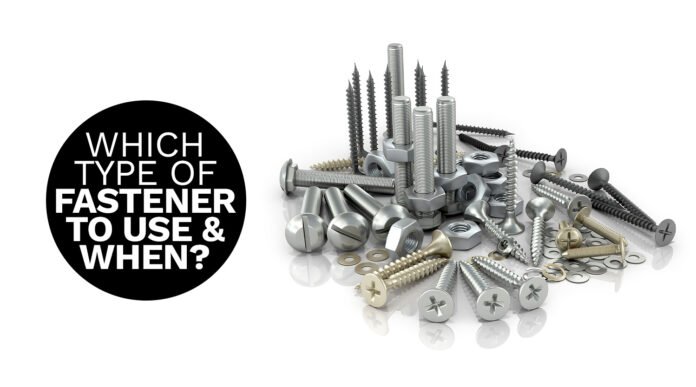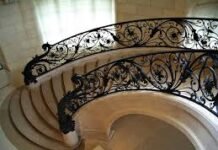Fasteners. Bolts. Nuts. Screws. So many isn’t it? From shelves to engines, fasteners are quite essential. If you look around, everything is fastened together with the help of these little influential tools. Why is there so much variety among these tools? Each and every type of fastener can be used for several projects but specifically has the right usage to provide better strength and durability. Let us give you some expert guidance regarding the applications of fasteners to understand which works best.
Following is the basic information about different types of fasteners before we get into details about some common ones:
Table of Contents
Screws
Screws are threaded fasteners that hold two materials together and provide a better grip.
Bolts
It is like a bar that slides into the socket to fasten. It requires the matching nut to tighten unthreaded objects.
Nuts
They come in various shapes, especially hexagonal, and are fitted into a bolt securing the project and preventing any loosening.
Nails
They are very similar to screws but very slender in shape with a pointed metal pin, smooth shaft, and head at one end.
Rivets
These form permanent joints between objects as their headless end is beaten down when in place.
The above types of fasteners have further categories which explain relevant applications. Let’s understand a few good types so that you can make an informed choice according to your requirements.
CSK Philips
CSK Philips is one of the self-tapping screws that can pierce its own hole when it is driven inside the intended material. It can be screwed into either plastic, wood, or metal. The pilot hole size and the tip of the CSK Philips are very essential to ensure proper installation of the screw in the project. With good gripping features, they require minimum fastening time and effort. You will find them installed in hinges, tower bolts, and wardrobe sliding channels, drawer channels, furniture handles, and other such applications.
Machine Screw
Machine screws tighten two metallic materials together. These screws can be installed in pre-drilled holes only. They might look quite small but are very strong. To identify, it has a straight, untapered shank and a blunt end. The machine screw is the most common and versatile type available in various sizes, lengths, materials, and head types. It is used in furniture pull handles, fabrication of electronic devices, wardrobe cabinet handles, creation of engines, and industrial manufacturing equipment.
Pan Head
Pan Head manual screws have single-slotted heads and are mostly used for wooden and metal projects. This flat circular-headed screw provides a smooth edge for extra safety and enhanced appeal. One can notice this type of fastener in bathroom fittings, twin-wheel castors, sofa legs, bed fittings with pneumatic pumps, and auto hinges. These are the perfect solution where minimal protrusion is required above a surface, as their rounded design eliminates any sharp corners or edges, and hence, gives an ideal visual appeal.
SS Chipboard
It is a type of fastener that is often overlooked but quite useful. These are engineered to connect chipboard, particleboard, and other similar materials, offering excellent tightening. Also called, particle board screws, their usage is required where reliable connection is crucial. Its applications can be noticed in hinges, doors, wardrobes, drawers, and at various locations in modular kitchen. SS refers to these fasteners being of stainless steel material which provides corrosion resistance and hence, is appropriate for outdoor applications.
CSK Wood
These self-drilling screws can install two pieces of wood together. CSK stands for countersunk and this screw can come with either Philips or a flat head. Their flat head allows them to sink into objects or materials. Their flush surface is excellent for applications where functionality is one of the key aspects, such as tables and shelving. These are also used in wooden frame partition, cabinets, ships, and hardware.
SS Drywall
These types of fasteners are fabricated with stainless steel and bring exceptional results in sturdiness than MS drywall screws. Precision and finesse are crucial requirements in drywall installation which is why these fasteners are tailored to provide for the purpose. The fine threads of SS drywall fasteners allow them to efficiently grip such thin and fragile material without causing damage. It is used in fixing wood to wood, aluminum to wood, modular kitchen, frame on the wall, and mounting TV on the wall applications.
Wood Philips
These are commonly used for mechanical applications. The Philips head has four points of contact creating a representation of the plus sign. A screwdriver fits in easily and it is very easy to get traction when working with these wood Philips fasteners. You will find their appropriate usage in ships, wooden frame partition, hardware, shelves, and cabinets. When working on a large project where time is of the essence, wood Philips screws come in handy.
Carriage Bolt
A carriage bolt is a type of fastener that provides the absolute finished look. It is used with SS nut and washer. It has square necks, convex heads, and multiple threads which are used for fastening various surface materials. Its stainless material allows it to be a part of various outdoor projects such as docks, patios, wooden frames, ready-to-assemble furniture, and fences.
CSK Head
This single-slotted fastener maximizes the holding power and can be manually driven to fasten furniture joints. CSK stands for countersunk and as discussed before these kinds of fasteners thee flush to the surface of whatever they are screwed into. Its applications are hinges, tower bolts, wardrobe sliding channels, drawer channels, and furniture handles.
Pan Philips
As the name suggests these can be easily fitted with a Philips screwdriver. They promise a long-lasting performance as they hold the material firmly and also provide corrosion resistance. Its surface area is wider which distributes the force of the fastening more evenly, which lessens the chances of damage to the material it is screwed into. It is used in sofa legs, twin wheel castor, and bed fitting with pneumatic pump, auto hinges, and bathroom fitting.
Nowadays, as you can see, there are several types of fasteners based on material, size, head, finishing, and more. It might get quite difficult to choose the appropriate one. Yet, there is a suitable fastener for every project which is why if you research well about their applications, strengths, and weaknesses, then it won’t be so tiresome to find the right one.























